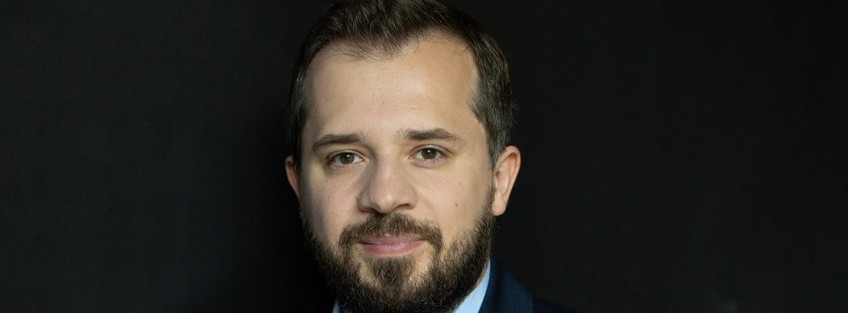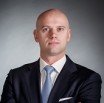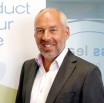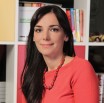An interview with Marcin Molin
Mon | 15.07.2019
Other
1. Dear Marcin, please introduce yourself shortly to members.
I have been General Manager for Philips Personal Health division in South East Europe since 2017, which is also the year I moved to Romania together with my wife and my three children.
I am born and raised in Poland, where I pursued an academic path in Marketing at the University of Warsaw, advanced also by an MBA from the University of Economics in Katowice. However, I have traveled extensively over the past 15 years thanks to leadership roles I held across Central and Eastern Europe, within both Philips and other leading companies.
I am guided in my personal and professional life by strong values and I feel motivated in my daily activity by our company’s mission of improving people’s lives through innovative products and solutions. All this I combine also with my passion for building high performance teams.
2. How and when did you find out about the NRCC and its activities?
Taking over my current role in Philips brought about valuable opportunities to connect with peers with whom I share a vision about progress, based on knowledge sharing and teaming up for impactful initiatives.
I was introduced to NRCC by my colleagues in Philips and this is how I discovered a long-standing fruitful partnership between our organizations, as well as an exciting potential to contribute to the development of the local business environment.
3. What motivated you to candidate for a position in the Board?
Philips has been a valuable partner for NRCC since the Chamber’s beginning and I want to continue the great work carried out by my predecessors, Robin van Rozen and Alexandru Popescu. I am keen on contributing to strengthening the Dutch-Romanian commercial relations, for which NRCC plays a particularly important role, as well as to the development of the business environment and overall Romanian society.
4. What are your expectations and plans for your mandate as a Board Member?
As Board Member, I see a chance to continue to actively participate and drive projects with significant impact, therefore I am looking to co-create the strategy of the Board and to be an active participant to as many of its leading initiatives.
Moreover, I think NRCC can play a more important public role on topics of national relevance, such as the future of healthcare system.
5. How does your background and expertise benefit the Board?
I believe I bring to the NRCC team an extensive experience in Dutch companies, spreading over 15 years, with significant involvement in international and multicultural organizations that allowed me to gain a comprehensive understanding of leadership and business development practices. Looking at our current footprint in Romania, we are continuously strengthening our leadership in both commercial and production operations, which grants me the opportunity to have a full perspective on growth opportunities.
6. Philips throughout its over 100 years of operation transformed from bulb producer to world class health technology leader. What does Philips stand for today?
Philips throughout its 128 years of operation transformed from bulb producer to world-class health technology leader. Among significant changes – one thing remained the same - our commitment to innovation and making the world healthier and more sustainable.
Today, Philips is a leading health technology company focused on improving people’s lives across the health continuum – from healthy living and prevention, to diagnosis, treatment and home care. We are focusing on cardiology, oncology, respiratory care, critical care as well as pregnancy and parenting – where we believe our integral approach can add outcome for patients and customers.
7. What do you think is the main role of innovation in healthcare and what is Philips doing to accelerate it?
At Philips, we innovate with purpose, as we believe it has the ability to transform the way healthcare is delivered and experienced and we aim to be a catalyst for this change and a partner in shaping the future of healthcare.
We look at innovation in terms of technology but also clinical innovation, business innovation and experience innovation. As I have mentioned, we like to visualize healthcare as a continuum since it suggests the notion of continuous care. By addressing healthcare as a ‘connected process’ in this way and leveraging our know-how and experience in both personal health and professional healthcare, we can drive innovations that help deliver on the ‘quadruple aim’.
We also strongly believe that innovation happens in collaboration. Therefore, we collaborate with hospitals across the world, with academia, start-ups and other companies. We have innovation hubs around the world that bring all of those capabilities together. We do research, engineering, design and we empower our teams to both understand the current needs of societies and to think ahead of their generations. For example, 60% of our people working in R&D are focused on software and data science.
More so, Philips has its own start-up program that supports scaling up most innovative and impactful ideas. We are partnering with entrepreneurs who are challenging the status quo by developing ground-breaking hardware, software and services in health and personal care. Our program Philips HealthWorks connects these companies with the expertise they need to break through in the health-tech world, and for example the 2018 theme of the program was Artificial Intelligence.
8. What innovations does Philips deliver to Romania?
We have a wide range of consumer and medical technology products, services and solutions that address the needs of consumers or patients, of doctors and of healthcare providers in Romania. More so, we are very pleased to be one of the countries where we launch our latest innovations days or just months after the global release. This shows that Romania is one of the key markets for Philips, and that the same time, that Romanians are fast adopters of innovation.
Also, we are happy to also have a local manufacturing footprint in Romania. The Philips Orastie factory employs approximately 1 200 people and ensures the production of a variety of consumer oriented products both for local use as well as for export. More importantly, we believe it not only brings innovation to Romania, but also supports local innovation especially by supporting and empowering local communities in the surroundings through educational and developmental programs.
2025
2024
-
November (1)
-
October (1)
-
July (1)
-
May (1)
-
March (1)
-
February (1)
-
January (1)
2023
-
November (1)
-
September (2)
-
August (2)
-
June (1)
-
May (1)
-
April (2)
-
March (1)
-
February (2)
-
January (2)
2022
-
December (3)
-
November (4)
-
October (3)
-
September (4)
-
August (3)
-
July (6)
-
June (4)
-
May (4)
-
April (8)
- Marketing News by diARK - April 2022
- Finance News by Mazars Romania - April 2022
- Experience the Perfect Chauffeur Transfer with David Intercar
- Mobility News by Business Lease - April 2022
- NRCC MEMBER IN SPOTLIGHT, WOLTERS KLUWER
- Crowe Romania and DeclaratiaUnica.ro engage in the automation of the single return form and the offering of personalized consultancy
- Cryptocurrency News by Bitcoin Romania, April 2022
- Legal News by BBW LAW - April 2022
-
March (6)
-
February (4)
-
January (5)
2021
-
December (3)
-
November (4)
-
October (2)
-
September (2)
-
August (1)
-
July (5)
-
June (3)
-
May (5)
-
April (4)
-
March (7)
- Cryptocurrency News by Bitcoin Romania, April 2021
- HR News by CNA International Executive Search Romania, March
- Real Estate News by CTP Invest, March 2021
- Sale-Purchase of Agricultural Land Located Outside Build-Up Areas
- MEET THE NRCC BOARD CANDIDATES 2021
- Fleet Management – Complete Makeover or Small Adjustments?
- Cryptocurrency News by Bitcoin Romania, March 2021
-
February (5)
-
January (6)
2020
-
December (2)
-
October (2)
-
September (3)
-
August (2)
-
July (6)
- NRCC Member in Spotlight Interview - Autonom
- Insolvency Proceedings: New Rules
- Member in Spotlight, UniCredit Bank
- Financing opportunities overview for large enterprises, SMEs and other organizations
- Companies: Simplification of Formalities
- Call for Leaders | What is your readiness score to benefit from the EU SURE initiative?
-
June (5)
-
May (8)
- The State of Alert. New rules for the collective proceedings
- The Retail Industry
- EU grants up to 6 Mil Euro for SME-s investment projects
- Member in spotlight, Heisterkamp Transportation Solutions
- State of Alert...What Is New
- The forced transformation of the automotive industry – Mazars analysis
- State of Alert in Romania
- Reducing the Impact of the Pandemic
-
April (6)
-
March (2)
2019
-
November (2)
-
July (1)
-
June (1)
-
March (2)
-
January (1)
2018
-
October (2)
-
September (1)
-
August (1)
-
July (3)
-
June (2)
-
May (1)
-
April (1)
-
March (3)
-
February (13)
- NRCC Elections 2018 - Elena Badea
- NRCC Elections 2018 - Loreda Dragomir
- NRCC Elections 2018 - Simina Fodor
- NRCC Elections 2018 - Manuel Herraiz Orti
- NRCC Elections 2018 - Tom Leene
- NRCC Elections 2018 - Mircea Moga
- NRCC Elections 2018 - Ronald Oort
- NRCC Elections 2018 - Razvan Pascu
- NRCC Elections 2018 - Alexandru Popescu
- NRCC Elections 2018 - Mihaela Tudor
- NRCC Elections 2018 - Loredana Van de Waart
- NRCC Elections 2018 - Edwin Warmerdam
- NRCC Elections 2018 - Philip Aarsman
2017
-
November (1)
-
September (1)
-
August (2)
-
May (1)
-
April (2)
-
March (1)
2016
-
November (1)
-
September (8)
-
June (1)
-
February (2)








